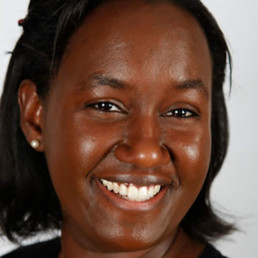
Written by Fabia Turner
Over ten years’ combined experience in education and educational publishing and a member of the Critics of Colour Collective
I first realised I wanted to make books when I was five years old. I’d just bought Mr Greedy by Roger Hargreaves, from a stall in my school’s lobby. The purchase price was a mere 10 pence, and in that brief exchange of money for books, my life changed forever.
As I proudly held that little paperback, I experienced what I can only describe as sensory joy! The pristine shiny cover, the whiff of glue/ink on every page turn plus the satisfying creak from the spine as it inevitably yielded. I knew right then the magical process of creating books was a thing I must be part of.
The problem was I was Black, and Roger Hargreaves was not. Neither were Jean and Gareth Adamson who created the Topsy and Tim series…or Roald Dahl, Eric Carle, Shirley Hughes, Helen Creswell, Ian Serraillier, Michael Bond, Edgar Allan Poe, or Henry Wadsworth Longfellow. These writers dominated my childhood experience and although their texts undeniably developed my literacy skills, they simultaneously dampened my ambition to work in publishing. Lack of exposure to diverse literature in my formative years meant I believed only white people were skilled enough, clever enough, and powerful enough to write and publish books.
It wasn’t until GCSEs, when a radical history teacher introduced me to Toni Morrison, that I was finally exposed to Black authors. I devoured Morrison’s books, but the damage had already been done. My early literary experiences were deeply ingrained in my psyche and I had zero confidence in my abilities as a creative.
Later, my A-level English teacher begged me to apply to Oxbridge, but fear of failure took over, and I refused. After all, in class we’d studied Shakespeare, Hughes, Wordsworth, Larkin, Chaucer…you see where I’m going with this! My parents didn’t envisage a publishing career for their Black daughter either so, eventually, I became a teacher, and the years rolled by. It took 25 years, from the time I bought Mr Greedy, to believe I was just about good enough to attend a publishing interview—and to my complete shock, I got the job!
I tell you all this so you understand the real impact of limiting access to multicultural resources on Black children’s outcomes. The literature we are exposed to when young plays a huge part in shaping our view of ourselves and the world around us. Publishers, educators, and parents need to be vigilant and discerning about the range of texts available to young readers to ensure they develop the self-confidence, self-worth, and drive to pursue their deepest desires.
Which leads me to my next point: quality not quantity. Some Black books hitting the market, from white and Black authors, may check the diversity box but do not meet the high standards required for whole-class teaching. Teachers should not feel pressured to include Black texts—especially those written by celebrities—if they are not up to scratch. (I won’t name names!)
As we’ve always done, regardless of the author’s ethnicity, texts need to be scrutinised for their suitability, otherwise we’ll just start pedalling backwards! The recent misjudged illustration, discovered by a student in one of AQA’s psychological textbooks, points up the need to evaluate all aspects of educational resources.
So far on my book quest, I have encountered some inspirational like-minded teachers who are working hard towards change for the better. I would like to shine a light on some of them:
Calder Valley Books for Change: Amazing early years teacher, Ciara Sturges, has organised a much-needed crowdfunding initiative. Her aim is to raise enough money to buy quality diverse and inclusive books for every primary school in the Calder Valley, from Rastrick to Walsden. Follow her on Instagram and donate to her JustGiving page if you can.
Jamel C Campbell is an early years educator, EY consultant and aspiring children’s author. He has worked in the industry for 18 years. Jamel is one of the UK’s Men in the Early Years Champions/Ambassadors. He has featured on numerous platforms as a keynote speaker and collaborated with many well-respected EY professionals. He stresses the importance of having men in the early years and a balanced workforce. He offers three training workshops for EY teams and settings, based around approaches to practice and staff wellbeing. Follow him on Twitter or Instagram.
Jen Foster is a passionate educator and mentor who has released a refreshingly frank special-edition issue of her e-mag Foster Our Teachers, which focuses on diversity and inclusion in UK schools. It’s called ‘The Inclusion Issue’, it’s free to download and is written for teachers by teachers. It contains a great article about use of multicultural texts in the classroom. Follow Jen on Instagram to get the link to download the e-mag.

